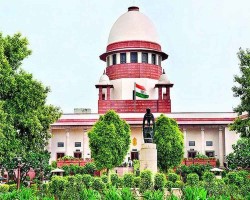UPSC Current Affairs
| National |
|---|
|
|
|
Why in the news?
Multiple parties moved the Supreme Court on the eve of a Special Bench hearing petitions challenging the validity of the Places of Worship Act, 1991, which preserves the character of religious places as they existed on August 15, 1947. Why was the Places of Worship Act enacted? The Places of Worship Act was passed by the Parliament and enacted into law in 1991 during the peak of the Ram Janmabhoomi movement. The Babri Masjid was still standing when the Act was introduced by Prime Minister P V Narasimha Rao’s Congress administration. About Places of Worship (Special Provisions) Act, 1991: It is described as an Act to prohibit conversion of any place of worship and to provide for the maintenance of the religious character of any place of worship. The Act declares that the religious character of a place of worship shall continue to be the same as it was on August 15, 1947. It says that no person shall convert any place of worship of any religious denomination into one of a different denomination or section. Exemption: The disputed site at Ayodhya was exempted from the Act. Due to this exemption, the trial in the Ayodhya case proceeded even after the enforcement of this law. Any place of worship which is an ancient and historical monument, or an archaeological site covered by the Ancient Monuments and Archaeological Sites and Remains Act, 1958. A suit that has been finally settled or disposed of. Any dispute that has been settled by the parties or conversion of any place that took place by acquiescence before the Act commenced. Criticism: The law has been challenged on the ground that it bars judicial review, which is a basic feature of the Constitution. It imposes an “arbitrary irrational retrospective cutoff date,” and abridges the right to religion of Hindus, Jains, Buddhists, and Sikhs. Way forward: The major issues put forward concerning the Places of Worship Act, of 1991 are: Whether Sections 2, 3, and 4 of the Places of Worship Act 1991, violate Articles 14 and 15 and the guarantee of equality in the Constitution? Whether Sections 2, 3, and 4 violate Articles 25, 26, and 29 and the basic feature of secularism in the Constitution? Whether temples ‘destroyed by invaders’ remain temples under Hindu and Islamic personal law? Ensure the Act does not restrict judicial review, preserving the judiciary's role in upholding constitutional rights. Strike a balance between preserving religious character and respecting the rights of different communities. |
| >> More UPSC Current Affairs |
